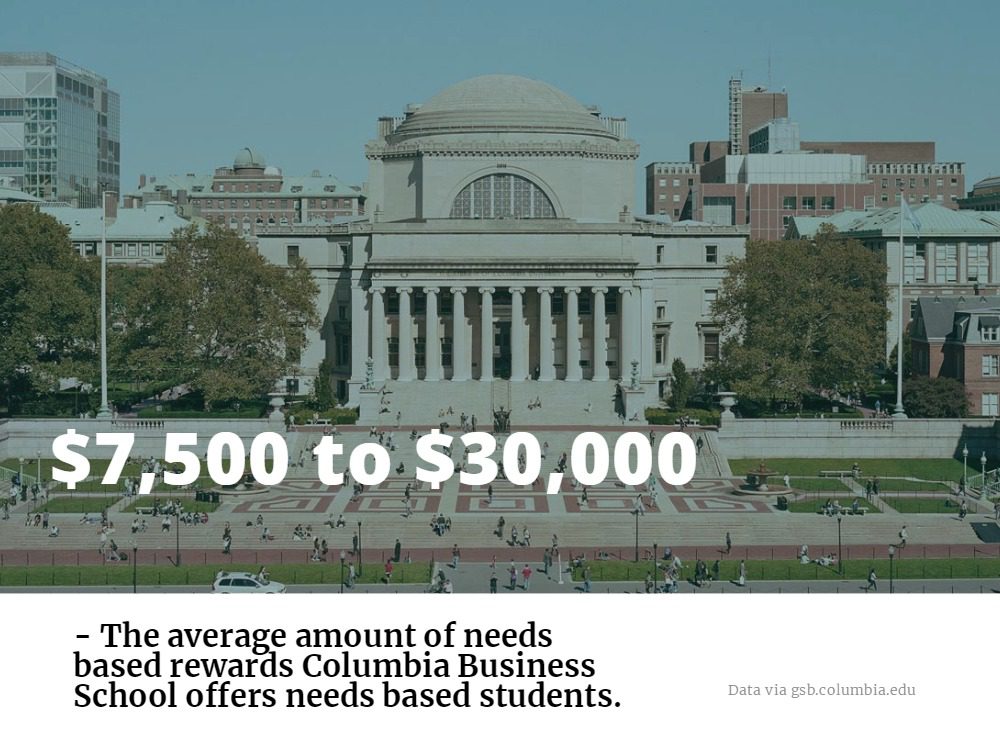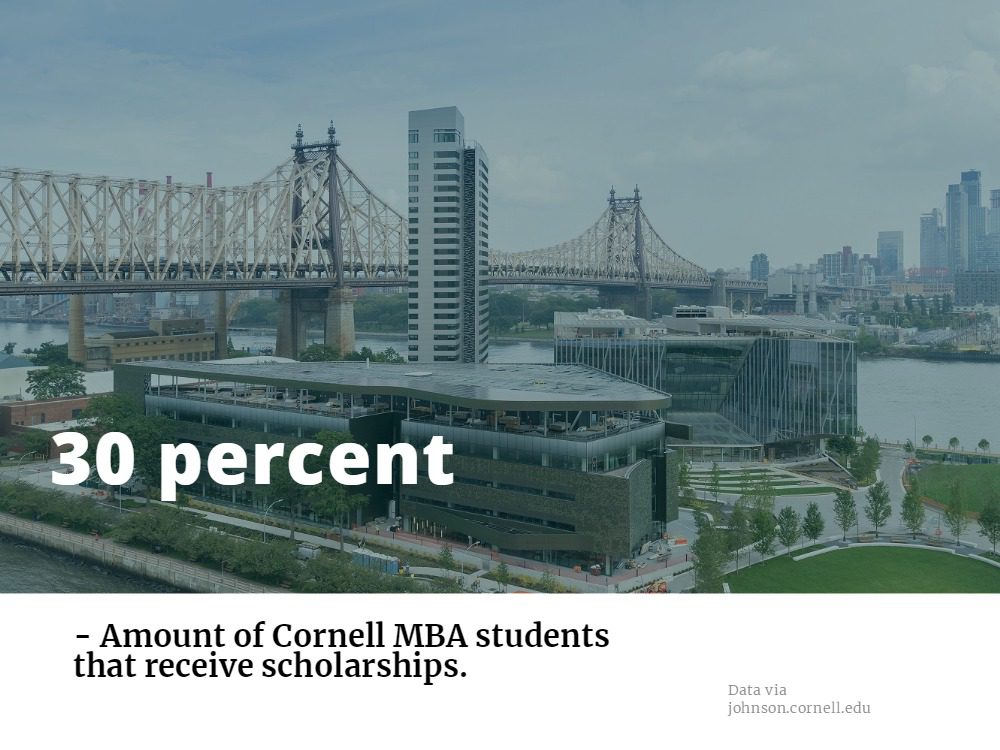Financing Strategies For “Nice” People, and More – New York News

Let’s explore some of the most interesting stories that have emerged from New York business schools this week.
When It Comes To Their Finances, Nice Guys Fall Short – Columbia Business School News
According to new research co-authored by Columbia Business School‘s Sandra Matz, “people who describe themselves as ‘agreeable’ are strongly connected to a bleak financial future—including lower savings, higher debt, and a higher likelihood of becoming financially insolvent.”
Matz elaborates, “This research proves that being nice may win friends but it can cost a lot of money. This is especially true for those who start off with less money, as they have no financial safety net to compensate for their personal habits. Unfortunately, having a nice and warm personality—in the arena of business and finances—can often have real financial costs.”
According to the article, “Agreeable individuals perceive money to be less important than their more disagreeable counterparts, and consequently have, on average, worse financial health—which is measured by savings, debt, and default behaviors.”
“Nice Guys Finish Last: When and Why Agreeableness Is Associated With Economic Hardship” was published in the Journal of Personality and Social Psychology.
You can read more about Matz’s research here.
Opportunities Abound in Distressed Debt Investing – Gabelli Connect
The Fordham University Gabelli School of Business recently hosted a talk at its McNally Amphitheatre on the subject of “distressed debt investing,” a multi-trillion dollar industry in which “investors hunt for opportunities where they can purchase debt [with the hope] that the gambit will pay off eventually.”
Attendees were privy to first-hand accounts of distressed debt investments and legal advice from a variety of experts. Baupost Group partner Fred Fogel highlights the “importance of both curiosity and perseverance.” Paul Weiss Bankruptcy and Corporate Reorganization Co-Chair Alan Kornberg “encouraged those just starting out to get a feel for the process by sitting in on bankruptcy hearings.”
Former Wachtell Lipton Bankruptcy Department Head Chaim Fortgang emphasizes the creation and maintenance of “good working relationships.”
You can read more about the talk here.
Look to Entrepreneurs For What’s Next in Healthcare – Johnson Business Feed
The Johnson Business Feed interviewed visiting faculty member Elspeth Murray about the increasing demand for innovation in the healthcare industry, from the use of smartphones to the expansion of ambulatory care.
“Consumer behavior has changed, and that will begin to push on the healthcare system. At a certain point, healthcare practitioners are either going to lose patients or be forced to adopt new ways of treating and accommodating patients.”
She advises students returning to school to focus beyond their specialty and remain “open to taking risks and re-framing your view of the industry, and to be aware of what is happening outside of your bailiwick. Take a good look around at what’s happening and go for it.”
Murray’s 2002 book, Fast Forward: Organizational Change in 100 Days, which she co-authored with Peter R. Richardson, explores how “entrepreneurial thinking gives you the creative ideas and the juice and design thinking helps you see the problems to be solved in the right way.”
Check out the rest of the Murray interview here.
Columbia Research Identifies Customers At Risk, and More – New York City News

Let’s explore some of the most interesting stories that have emerged from New York business schools this week.
Online Companies Beware: New Columbia Business School Research Reveals That Customers With High Activity May Be At Risk Of Leaving the Company – Columbia Business School Blog
Columbia Business School professors Eva Ascarza and Oded Netzer recently published new research that explores how “customers end their relationships with companies in new and unpredictable ways.”
Professor Ascarza writes, “Companies need to understand the ramifications of this paper, because in the digital age, the landscape on customer retention has changed. Unlike the past when a consumer might have had to physically call to end a relationship with a company, today some customers are leaving without saying goodbye.”
Professor Netzer adds, “When it comes to customer retention levels, the most important thing is acknowledging that, in this new hybrid setting, there are indeed two unique types of customers who are at risk of ending their relationship with a company.”
“If businesses want to continue amassing and retaining loyal customers, they need to identify which customers belong in which bucket and then study their individual behavioral patterns so that they can take the appropriate measures to stop them before they walk out that virtual door.”
You can check out the article and the full study here.
Analytics Career Fair Draws Dozens of Recruiters to Meet Business Students – Stevens Institute of Technology School of Business Blog
The Stevens Institute of Technology School of Business Intelligence & Analytics program recently hosted a networking event in which Bed Bath & Beyond VP of Consumer Analytics Melanie Murphy spoke “with dozens of master’s students about how their analytical insights create value in business.”
Of Stevens’ Biz Intelligence & Analytics program, Murphy writes, “The program is so well balanced, from data, to different types of analytics, to the business intelligence perspective—and the students are incredibly smart.”
She adds, “You can tell, in talking with these students, that they’ve had that experience of getting in front of people and sharing ideas.”

Bed Bath & Beyond VP Melanie Murphy (right), talks with Stevens Business Intelligence & Analytics students / Photo via stevens.edu
According to the article, recruiters from Robert Half, L’Oreal, Jefferies, and UBS, among companies, “attended the event to meet and ask questions of students about their research.”
L’Oreal Assistant VP of Human Resources Information Services Gary Winant “brought in a Stevens team to examine turnover in a particular department, and use predictive tools to recommend solutions.”
He writes, “The students here come ready to work. I met with the students twice and was impressed by their commitment. We came back to them three months later with additional questions and even though the project was over, they took the time to respond in detail.”
You can read the full report from this year’s Business Intelligence & Analytics program here.
Graduate Students Provide a Helping Hand for New Business Owners – Gabelli Connect
Fordham’s recent Entrepreneurial Law Clinic was a joint effort between the Gabelli School of Business and Fordham Law, which “brought together students to work on behalf of … social ventures that seek to create positive change in society and companies founded by low-to-moderate income entrepreneurs who otherwise would be unable to afford an attorney.”
One business the Entrepreneurial Law Clinic supported was ConBody, “a boutique gym where New Yorkers learn a workout regime” its proprietor Coss Marte developed in prison. Marte, who received business training at “Defy Ventures, a non-profit that helps formerly incarcerated individuals start businesses,” got legal counseling from Fordham law students and fundraising advice from Gabelli students.
He writes, “They’re absolutely geniuses. They shot me questions that I never really thought about, and I was like, ‘Oh, I should do that.’ They were really on top of their stuff, and really hungry in helping me.”
You can check out the full piece here.
The Differences Between a Full-Time MBA in New York City and Toronto

New York and Toronto are the largest cities in the United States and Canada, respectively. Both are major financial and cultural centers, and home to millions of hard-working students, employees, and businesses.
Both metros are also home to a number of quality business schools, each with their own prestigious full-time MBA programs. How do New York and Toronto compare as cities and as destinations for your full-time MBA studies? Let’s take a deeper dive and see.
Location
The most bustling and populous metro in the United States, New York City is is the capital of the business world. More Fortune 500 companies are headquartered here than in any other city. The Big Apple is not only home to Wall Street and the world’s largest financial institutions, but also media, marketing and advertising companies. New York is an enormous city and, unfortunately, expensive to live in, so it may not be for everyone.
When looking at metros with bustling financial sectors and companies, New York is often is the first to come to mind. But how about it neighbor to the north? Toronto is also considered one of the world’s fast-growing financial hubs. An article on the Huffington Post explains how Toronto has risen into the top 10 of the world’s most important financial centers. According to the Global Financial Centres Index from Z/Yen Group and Qatar Financial Centre, Toronto has surpassed Chicago and Boston to become the second-most important financial center in North America, and eighth in the world.
According to one unidentified New York banker quoted in the Global Financial Centres Index survey, “Toronto seems to get stronger and stronger. A number of our rivals have opened up subsidiaries there.”
New York City Full-Time MBA Programs
- Columbia Business School
- Stern School of Business – New York University
- Gabelli School of Business – Fordham University
- Zicklin School of Business – Baruch College
What stands out about these programs?
A Columbia MBA opens up countless career options and is sure to pay off in the long run. The median starting salaries for Columbia MBAs is $125,000, with 34 percent of full-time MBA of graduates being employed in the financial services industry. Students may assemble their own elective tracks, but the school also provides recommend course tracks for students interested in careers in entrepreneurship, healthcare, marketing, media, real estate, value investing, and social enterprise.
Meanwhile, Stern’s MBA curriculum gives students tons of flexibility, and allows degree seekers to choose one or two MBA specializations, NYU allows up to three specializations from 20 plus options. Stern makes sure that all students enrolled in the full-time program are ready for business school: Stern hosts a mandatory two-week orientation program in August called “Launch” as well as a special “Summer Start” program that allows students the school believes may need additional preparation to earn up to six credits before starting courses with their classmates in September.
Both Gabelli and Zicklin’s full-time programs feature cohort-based structures. Gabelli’s program features a New York immersion experience where, over the course of five days, students are exposed to a number of company visits with corporations like Deutsche Bank, Money.net, and Hewlett Packard. As an alternative to completing a major, Zicklin students may pursue a joint JD/MBA in conjunction with Brooklyn Law School or New York Law School.
Toronto’s Full-Time MBA Programs
- DeGroote School of Business – McMaster University
- Ivey Business School – Western University Canada
- Schulich School of Business – York University
- Ted Rogers School of Management – Ryerson University
What stands out about these programs?
DeGroote’s full-time MBA is a 16-month program ideal for candidates who are early in their career and want to gain advanced business knowledge in order to have more job opportunities. McMaster is one of only four Canadian universities ranked among the top 100 in the world, including by premiere publications like The Financial Times.
Ivey’s full-time program stands out because it can be completed in one year. During the year, students will learn business essentials from Canada’s only case-based MBA program. Students are able to experience real-world business scenarios through more than 300 cases a year, providing them of hands-on experience for how to best handle a variety of business scenarios.
The Sculich School of Business full-time MBA program is non-traditional due to its amorphous teaching format: The organization, pedagogy, and style of classes is determined solely by the most effective way to teach a particular course. This means that while some course instructors make extensive use of case studies, others do not. Other approaches to delivering courses include in-class presentations, role-playing exercises and visiting speakers and business leaders.
Schulich’s program, however, is on the more expensive side when it comes to Toronto metro business schools. The current full cost of the program in 2018-19 is $77,900 CAD for Canada residents, and $99,400 for international residents. While the tuition costs are actually higher than the likes of NYU Stern or the Columbia Business School full-time programs, because of the cost of living in New York City, the price is actually negligible—especially for Canadian residents.
Schulich/NYU/Columbia Full-Time MBA Costs
| York/Schulich | NYU/Stern | Columbia Business School |
|---|---|---|
| $57,000 (Canada Residents) | $69,086 USD | $71,544 USD |
| $77,900 (Full Cost, Canada Resident) | $110,562 (Full Cost, U.S. Resident) | $107,749 (Full Cost, U.S. Resident) |
Ryerson’s full-time MBA stands out thanks to its Management of Technology and Innovation (MBA-MTI) program, which provides graduates with skills in problem-solving, critical thinking, communication and collaboration. Despite it’s technical sounding name, the MBA-MTO is not a technical program. Instead students enrolled in this track graduate with the skills needed to manage within companies that are focused on tech and innovation.
Breaking Down the Numbers
Even for those who do not pay extra for room and board, expenses for U.S. residents studying at many NYC business schools will be higher than their neighbors to the north. According to Numbeo, the cost of living in Toronto is 24 percent less than the cost of living in New York City, and rent is nearly 40 percent less.
However, the value of the individual school tends to favor New York City programs over its Toronto counterparts. NYU Stern is currently the 12th overall on the U.S. News & World Report 2018 ranking, with CBS coming even higher at 9th overall. The ranking comparison remains consistent with The Economist as well, with CBS coming in 9th (again), Stern coming in 14th. The highest ranked Canadian program in The Economist ranking—Ivey Business School—came in 59th.
NYC/Toronto MBA Rankings
| School | Financial Times Ranking (2018) | The Economist Ranking (2017) |
|---|---|---|
| NYU Stern | 23 | 14 |
| Columbia Business School | 7 | 9 |
| Ivey | 90 | 59 |
| Schulich | NR | 69 |
The higher rankings and costs tend to, unsurprisingly, have a high correlation with financial output. MBA graduates from higher-ranked NYC metro schools tend to do better in terms of salary and bonuses. As previously mentioned, CBS Class of 2017 MBA grads pulled in a median annually salary of $125,000. Class of 2017 Schulich grads, in comparison, made an average median salary of around $90,000 USD.
For more information on the best full-time programs, check out our New York City and Toronto metro pages.
How NYC Business Schools Help the Underprivileged Applicants

Pursuing an MBA is a shrewd move for anyone looking to earn a competitive salary right out of school. Though attending a renowned school can up the price tag of earning an MBA, it may also increase the overall return on investment. According to an article in U.S. News & World Report, “… graduates of top-tier business schools usually earn higher starting salaries than their peers who went to lower-ranked schools.”
It’s not jut the opportunity to have a lucrative job right out of school that makes a high starting salary appealing. An enviable starting salary could mean more earning potential down the line. However, a top-tier school may seem out of reach for low-income applicants. After all, how can you enjoy the return on investment if you can’t afford to invest in the first place?
Luckily, many prestigious business schools offer resources for students from different socioeconomic backgrounds. Below, we’ve outlined the resources available for low-income applicants at five of New York City metro’s best business schools.
How NYC Business Schools Help the Underprivileged
Columbia Business School
Columbia Business School offers need-based awards to many students, which may result in anywhere from $7,500 to $30,000 in tuition support. Nearly half of applicants receive need-based scholarships, which are automatically renewed at the start of the second year. Columbia students can also apply for private and federal loans. To create incentive for students to choose careers in public and nonprofit fields, the school offers a Loan Assistance Program for students who utilize their education to pursue these paths. Students are eligible to apply for this program for up to five years after graduation. Depending on the extent of students’ debt, they may receive anywhere from $2,000 to $10,000 of annual support. Columbia students may also receive merit-based scholarships, such as the Columbia Fellows Program, which may cover full or partial tuition and is granted to applicants with an outstanding track record in leadership and creativity.

Stern School of Business—New York University
NYU’s Stern School of Business offers a variety of scholarships for high-achieving applicants. According to the school’s website, nearly a quarter of students who enter the full-time MBA program receive a merit-based scholarship. There are also additional merit-based opportunities for students coming from different backgrounds and perspectives. Scholarships like the Advancing Women in Business Scholarship and the Forte Fellowship are particularly geared toward female-identifying students, to support women in business. The ROMBA Fellowship aims to help LGBTQ students succeed in business education. The Consortium Fellowship exists to increase the number of minorities such as Hispanic Americans, Native Americans, and African Americans in business school as well.
Gabelli School of Business—Fordham University
At the Fordham University Gabelli School of Business, graduate students may be eligible for federal financial aid, merit scholarships, or a variety of graduate assistantships. Awards based on academic excellence range from $10,000 to full tuition. Exceptional students may be eligible for awards like the Dean’s Premier Scholarship, which includes a $20,000 living stipend, and may include a stipend toward one of Fordham’s global programs. Students can also apply for a plethora of need/merit-based scholarships, like the Hitachi Diversity and Inclusion Scholarship, which seeks to help underrepresented minorities finance their education.
Rutgers Business School, Newark and New Brunswick
The Financial Times ranked Rutgers Business School among the top 50 MBA programs for return on investment in 2017, citing a 130 percent increase in salary for students within three years of completing their degree. Moreover, the school’s website states that, “More than 80 percent of Rutgers students receive some form of financial aid.” Moreover, at $31,011 per year (not including fees), this program is far more affordable than many other prestigious schools. Students can apply for federal or private loans, grants, and an array of scholarships. In addition to the awards offered by the Rutgers Business School Graduate Scholarship Fund, the Rutgers website lists 30 fellowships, scholarships, and partnerships. The Ralph Bunche Fellowships, for example, provide tuition remission, and a $15,000 living stipend to minority students from disadvantaged socioeconomic backgrounds.
SC Johnson Graduate School of Management—Cornell University
Around 30 percent of entering the SC Johnson Graduate School of Management students receive some level of scholarship support. Scholarships like the National Society of Hispanic MBA’s (NSHMBA) and the TOIGO Fellowship specifically seek to help underrepresented minorities. The MD MBA Dual Degree Program and Lee Family Scholarship supports students on the rigorous path to receive their MD/MBA. Additionally, Cornell’s Park Leadership Fellows Program awards full tuition to up to 25 MBA applicants annually. The award is granted based on personal and professional achievements, academic performance, social contributions, and leadership. Students can also apply for federal and private loans.

Showdown: Find Out if You Should Get an MBA in New York City or Los Angeles

The battle for hip-hop supremacy may have ended in the ’90s, but we can keep the East Coast-West Coast beef alive while looking at full-time MBA programs in New York City and Los Angeles.
Both cities are home to top business schools and are ripe with employment opportunities in booming industries. But which is best for you? Let’s take a deeper dive.
Location
We’ll start with location, location, location.
The most bustling city in the country, NYC is is the capital of the business world. More Fortune 500 companies are headquartered here than in any other city. The city is not only home to Wall Street and the world’s largest financial institutions, but also some of the largest media, marketing, and advertising companies. While New York City can be daunting in its size, it’s also furiously expensive to live in, so it may not be for everyone. Getting to know the city’s vast public transportation system is a must and it can get pretty cold in the winter, so if you’re looking for beaches, keep reading.
Meanwhile, LA is Tinseltown. The city’s economy is driven by entertainment industries like television, film, video games, music recording, and production, but also by international trade, technology, petroleum, fashion, apparel, finance, telecommunications, and tourism. In the 2017 Global Financial Centres Index, Los Angeles was ranked as having the 19th most competitive financial center in the world, and sixth most competitive in United States. The city is also the largest manufacturing center in the western United States, with the ports of Los Angeles and Long Beach comprising the fifth-busiest port in the world and a vital trade route within the Pacific Rim.
New York City Full-Time MBA Programs
Full-time MBA Programs in New York City include:
- Stern School of Business – New York University
- Gabelli School of Business – Fordham University
- Columbia Business School
- Zicklin School of Business – Baruch College
What stands out about these programs?
A Columbia MBA opens up countless career options and is sure to pay off in the long run: The average starting salaries for Columbia MBAs is $104,000, with 37 percent of full-time MBA of graduates being employed in the financial services industry.
Meanwhile, Stern’s MBA curriculum gives students tons of flexibility, and allows degree seekers to choose one or two MBA specializations, NYU allows up to three specializations from 20 plus options.
Both Gabelli and Zicklin’s full-time programs feature cohort-based structures. Gabelli’s program features a New York immersion experience where, over the course of five days, students are exposed to a number of company visits with corporations like Deutsche Bank, Money.net, and Hewlett Packard. As an alternative to completing a major, Zicklin students may pursue a joint JD/MBA in conjunction with Brooklyn Law School or New York Law School.
Los Angeles Full-Time MBA Programs
Full-time MBA Programs in Los Angeles include:
- Anderson School of Management – UCLA
- Argyros School of Business – Chapman University
- Graziadio School of Business and Management – Pepperdine University
- Marshall School of Business – USC
- Peter F. Drucker and Masatoshi Ito Graduate School of Management – Claremont Graduate University
What’s special about these MBA programs?
Anderson features a Business Creation Option for MBAs, which gives students the chance to start their own businesses while still in school. Meanwhile, the Special Project Option challenges groups to tackle problematic issues that impact an entire industry.
Chapman’s full-time MBA curriculum features three main components—core/required courses, a capstone course, and elective courses. Students have several track options available to concentrate their studies, including: Corporate Finance, Marketing, Investment Management, Entrepreneurship, Information Systems in Digital Times, and more.
Graziadio full-time MBA students have the option to spend a trimester abroad in the fall term of their second year at one of Pepperdine’s partner universities in Africa, Asia, Europe, Latin America, or Oceania.
USC MBAs have required study-away coursework called PRIME International Experiential Learning, a 10-day site visit overseas. Students must complete industry—and company-oriented recommendations in capstone projects that incorporate concepts from global strategy and global economics.
At the Drucker School, students may choose two areas of concentration to focus their studies, and select elective within these areas of concentration. Concentrations are offered in: Strategy, Finance, Marketing, Leadership, Global Management, and Information Technology Management.
Jobs and Salary
When it comes to job placement, both New York and Los Angeles have their perks.
New York is home to business school with the highest job placement rate: Around 97 percent of Columbia Business School graduates receive offers within three months of graduation. The school’s class of 2016 boasted an average starting salary of roughly $125,000 plus a $25,000 signing bonus. The top three industries that employ Columbia graduates are financial Services (37 percent), consulting (35 percent) and technology/media (10 percent).
Check out a complete breakdown of NYC salaries and employment opportunities, give our guide to getting paid in New York a read.
While Silicon Valley has a reputation for being the prime place for MBA jobs in California, LA has been catching up recently—and fast. Los Angeles has embraced the tech boom in a big way, with many Valley bigwigs and new startups alike moving their operations to Silicon Beach. With that in mind, the new era of LA innovation is creating some lofty starting salaries, particularly for MBA graduates.
Recent UCLA Anderson graduates earned an average starting salary of $121,250 with a $25,000 signing bonus, according to statistics released by the school. The top five industries to employ Anderson MBAs are in tech (30.6 percent), financial services (21.6 percent), consumer products (13.4 percent), and consulting services (13.4 percent).
Check out our guide to the highest MBA salaries in Los Angeles for more information.
Full-Time MBA Battle: New York vs. Philly

Whether it’s Giants vs. Eagles or the Statue of Liberty and the Liberty Bell, New York City and Philadelphia are two cities famous for being at odds with one another. Continue reading…
